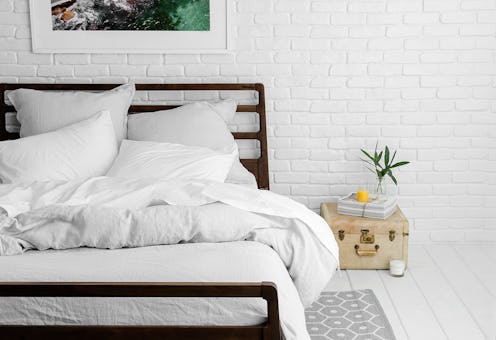For many adults, getting a good night’s sleep is unfortunately easier said than done. Any number of factors can affect how many zzz‘s you’re able to catch in one night, and while there’s no all-encompassing golden rule, there are certain measures you can take to increase the likelihood of snoozing for a solid eight hours (or six, or five … whatever your magic number may be). We tapped an expert—Ariel Kaye, founder and CEO of Parachute—to share her top tips on what to look for in (and demand of) your bedding for better-quality rest.
The real deal on thread count
"We’ve been trained to equate large numbers with luxury, but this logic is not the case when it comes to textiles. Thread count isn’t important—in fact, it’s largely a marketing gimmick. Anything over 400 thread count is a result of manipulation of the fabric, so the sweet spot is somewhere between 280 and 350. What actually matters more than thread count is the caliber of the fabric. Parachute uses long-staple Egyptian cotton and the purest linen, which translates to softer, stronger bedding that lasts over time."
What to look for when buying bedding
"Choosing bedding is a personal preference. I always recommend you consider factors like whether you naturally sleep hot or cold and what texture you like to feel against your skin because certain fabrics will enhance those sensations.
We often compare our Percale (made from Egyptian cotton) to the perfect button-down shirt—cool and crisp to the touch. Its classic one-over-one-under weave make it an exceptionally breathable fabric, and a stonewashing process gives it a more casual appearance.
Sateen is extremely smooth and has a unique weave: four-over-one-under. Fun fact: Sateen bedding is more wrinkle-resistant.
Linen is a natural fiber made from the flax plant and is a stronger, more durable alternative to cotton.
Also, 'wrinkle-free' or 'permanent press' labels should be avoided because manufacturers treat these fabrics with formaldehyde resin, a toxic chemical. Instead, you should look for bedding that is Oeko-Tex certified, meaning no harmful chemicals or toxins are used. (Yes, all of Parachute’s home essentials are Oeko-Tex certified!)"
How to care for your bedding
"Water temperature depends on the fabric. For percale and sateen sheets, we recommend washing with cool water. For linen sheets, use warm water. Always use mild, liquid soap—and less than the manufacturer calls for. Allow the detergent to dissolve before adding your bedding to the washer. If you use bleach, make sure it’s non-chlorine. Only wash like items together—the same color and fabric—and never wash bedding with clothes because zippers, buttons, etc. can cause pilling and abrasion."
What to keep near your bed
"Simplicity is everything. I like to keep my bedroom uncluttered, making the environment primarily about sleep and rest. My bedroom is the only room in my home that doesn’t have art on the walls! For my bedside table, this means I only stock the essentials: a carafe of water, a catch-all tray for small, personal belongings and fresh flowers or a candle to make the room smell great.
I also recommend investing in an alarm clock because blue or green toned lights from your smartphone interfere with natural melatonin production, making it harder to sleep through the night. I know it’s a tough one, but it’s better to keep your phone out of the bedroom!"
